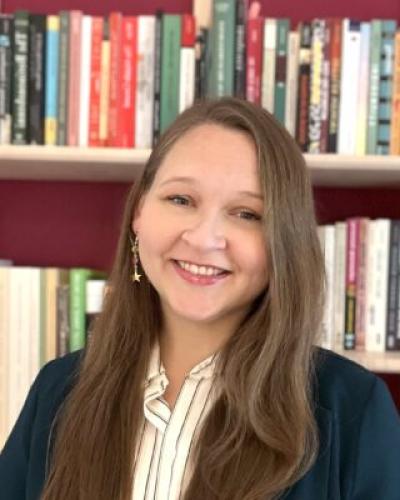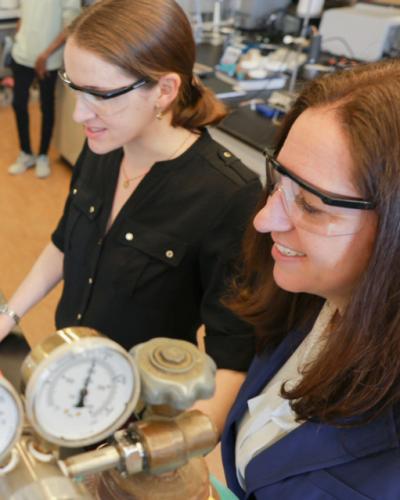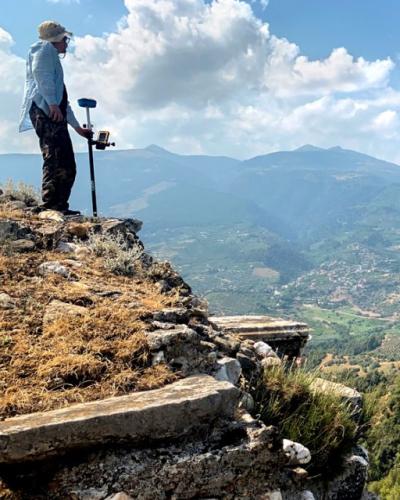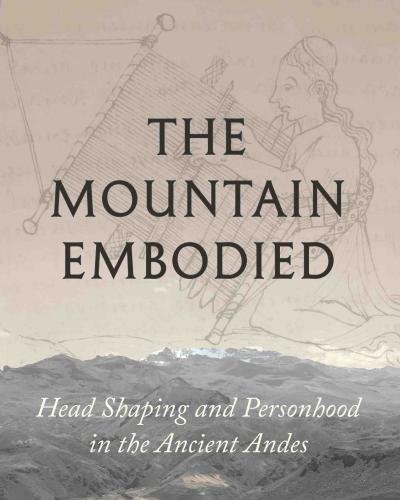See all of the ARKEO course offerings for Spring 2022 on our courses page.
Featured Undergraduate Courses: Spring 2022
ARKEO 2201
Early Agriculture
Day/time: MWF 11:20-12:10PM
Instructor: Nerissa Russell
Throughout most of the human career, people survived by hunting and gathering wild foods. The advent of food production is one of the most profound changes in history and prehistory. This course examines the current evidence for the appearance and spread of agriculture - plant and animal domestication - around the world. We will consider definitions of agriculture and domestication, the conditions under which it arises, the consequences for those who adopt it, and why it has spread over most of the world.
ARKEO 2271
The Aegean and East Mediterranean Bronze Age c. 3000-1000 BCE
Day/time: TR 11:25AM-12:40PM
Instructor: Sturt Manning
An exploration of the archaeology and art of the Aegean region and of its neighbors during the Bronze Age, ca. 3000-1000 BCE: the origins and precursors of the Classical World. The course will investigate the emergence of the first complex societies in the Aegean region in the third millennium BCE, and then the development and story of the Minoan and Mycenaean worlds and their neighbors in the second millennium BCE. Topics will include: the Early Bronze Age and the first complex societies in the Aegean (Cyclades, Crete, Greece, Anatolia); the collapse and reorientation around 2200BCE and links with climate change; the first palace civilization of (Minoan) Crete; the Santorini (Thera) volcanic eruption and its historical impact in the Aegean and eastern Mediterranean; the rise of the Mycenaean Greek palaces and the shift into proto-history; the development of an international east Mediterranean trade system; Ahhiyawa and the Hittites; the 'Trojan War'; and the collapse of the Late Bronze Age societies and links with climate change.
ARKEO 2285
Egyptomania? Egypt and the Greco-Roman World
Day/time: TR 2:45PM-4:00PM
Instructors: Caitlín Barrett, Stephen Sansom
This course explores the multifaceted interactions between ancient Egypt and the Classical world, from the Bronze Age to the Roman Empire. We will look at both archaeological and textual evidence (in English translation) to ask what this entangled history can tell us about life in the ancient Mediterranean. Among many other topics, we will consider Greek merchants and mercenaries in Egypt; Egyptian influences on Greek and Roman art; the famous queen Cleopatra, and her seductive but threatening reputation in Roman literature; the appearance of Egyptian underworld gods on Greek and Roman "magical gems" and curse tablets; and the ways that Greco-Roman representations of Egypt have shaped modern conceptions of Egyptian civilization, from 19th-century Romanticism to 21st-century pop culture.
ARKEO 2465
Global Heritage
Day/time: TR 9:40AM-10:55AM
Instructor: Adam Smith
Heritage typically conjures images of a glorified human past, and evokes sentiments of care for lost or endangered cultures that symbolize humanity's diversity. But heritage is also the foundation for a multi-billion dollar tourist industry and a basis for claims to national sovereignty. A closer look at heritage reveals institutions, places, and things possessed of extraordinary power. Drawing on case studies from around the world, this course attends to the complexities of heritage today. Topics include heritage ethics, tourism and the marketing of the past, approaches to preservation and management, disputed heritage and violence, heritage ideologies from nationalism to universalism, participation and inequality from the grassroots to the global, counterheritage, and the practice of public archaeology. Students apply insights gained by designing projects as heritage practitioners, engaged with heritage-scapes at Cornell and beyond.
ARKEO 2668
Ancient Egyptian Civilization
Day/time: TR 11:25AM-12:40PM
Instructor: Christopher Monroe
The course surveys the history and culture of pharaonic Egypt from its prehistoric origins down to the early first millennium bce. Within a chronological framework, the following themes or topics will be considered: the development of the Egyptian state (monarchy, administration, ideology), social organization (class, gender and family, slavery), economic factors, and empire and international relations.
ARKEO 2712
The Ancient Economy
Day/time: TR 8:05AM-9:20AM
Instructor: Astrid Van Oyen
Ancient economies were very different to our modern economy: there were no banks, transport and communication were difficult, and the discipline of economics did not yet exist. Yet there are also striking similarities between the ancient and modern economic worlds: many people liked luxuries, production was increasingly standardized, and buyers and sellers came together on market days. This course introduces the key characteristics of ancient economies, with a focus on ancient Rome but also looking at classical Athens and further afield. It is structured around themes such as trade and exchange, craft, consumption, and money. Its aim is to probe the nature of the ancient economy, both for students interested in the ancient world and for students keen to put the modern economy in historical perspective.
ARKEO 2720
From the Swampy Land: Indigenous People of the Ithaca Area
Day/time: TR 9:40AM-10:55AM
Instructor: Kurt Jordan
Who lived in the Ithaca area before American settlers and Cornell arrived? Where do these indigenous peoples reside today? This class explores the history and culture of the Gayogoho:no (Cayuga), which means people from the mucky land. We will read perspectives by indigenous authors, as well as archaeologists and historians, about past and current events, try to understand reasons why that history has been fragmented and distorted by more recent settlers, and delve into primary sources documenting encounters between settlers and the Gayogoho:no. We will also strive to understand the ongoing connections of the Gayogoho:no to this region despite forced dispossession and several centuries of colonialist exclusion from these lands and waters.
ARKEO 2812
Hieroglyphs to HTML: History of Writing
Day/time: MWF 1:30PM-2:20PM
Instructor: Athena Kirk
An introduction to the history and theory of writing systems from cuneiform to the alphabet, historical and new writing media, and the complex relationship of writing technologies to human language and culture. Through hands-on activities and collaborative work, students will explore the shifting definitions of "writing" and the diverse ways in which cultures through time have developed and used writing systems. We will also investigate the traditional divisions of "oral" vs. "written" and consider how digital technologies have affected how we use and think about writing in encoding systems from Morse code to emoji.
ARKEO 2846
Magic and Witchcraft in the Greco-Roman World
Day/time: MW 2:45PM-4:00PM
Instructor: Caitlín Barrett
This introductory course explores the roles of amulets, love potions, curse tablets, and many other magical practices in ancient Greek and Roman societies. In this course, you will learn how to invoke the powers of Abrasax, become successful and famous, get people to fall desperately in love with you, and cast horrible curses on your enemies! We will also examine a range of ancient and modern approaches to "magic" as a concept: what exactly do we mean by "magic," and how does it relate to other spheres of activity, like religion, science, and philosophy? When people (in ancient times or today) label the activities of others as "magic," what are the social and political consequences of that act? As we investigate the practices that Greeks and Romans considered "magical," we will also explore what those practices can teach us about many other aspects of life in the past, such as social class, gender, religion, and ethnic and cultural identity.
ARKEO 3042
Paleoethnobotany
Day/time: MW 9:40AM-10:55AM
Instructor: Maia Dedrick
This course will prepare students to identify, analyze, and interpret plant remains gathered from archaeological sites. We will build a conceptual framework to explain how human behavior relates to plant patterning, drawing on case studies from around the world. Through hands-on laboratory activities, we will study aspects of plant anatomy and explore methods for the sampling and identification of plant remains, including charred seeds and wood, phytoliths, starch grains, and pollen. We will analyze paleoethnobotanical datasets using database and statistical programs to present evidence in varying formats. Final projects will involve the first-hand study of plant remains sampled from archaeological sites.
ARKEO 3225
Archaic and Classical Greece
Day/time: TR 11:25AM-12:40PM
Instructor: Annetta Alexandridis
This lecture class centers on the formative periods of ancient Greek culture, the centuries from about 800-300 BCE. Its aim is to place Greece within the cosmopolitan networks of the Mediterranean and beyond, while simultaneously looking at specific local traditions. Only within this complex "glocal" frame will it become clear what is unique about Greek art.
ARKEO 3235
Bioarchaeology
Day/time: TR 2:45PM-4:00PM
Instructor: Matthew Velasco
Bioarchaeology is the study of human remains from archaeological sites. Like forensic scientists at the scene of the crime, bioarchaeologists search for clues embedded in human bone and mummified tissues to reconstruct how ancient peoples lived and died. As a dynamic living system, the human skeleton responds not only to hormones that govern human development but also to physiological stress brought on by disease, malnutrition, and trauma. The human body is also an artifact molded by cultural understandings of gender, prestige, self-expression, and violence. In this course, students will learn the scientific techniques for estimating skeletal age and sex, diagnosing pathology, and reconstructing diet and migration patterns. This course emphasizes the critical integration of biological and cultural evidence for understanding past individuals and societies.
ARKEO 3245
Across the Seas: Contacts between the Americas and the Old World Before Columbus
Day/time: MW 2:45PM-4:00PM
Instructor: John Henderson
This course considers the possibility of connections between the America and the Old World before the Spanish discovery not only as an empirical question, but also as an intensely controversial issue that has tested the limits of the scholarly detachment that archaeologists imagine characterizes their perspectives. We will consider the evidence for several possible episodes of interaction as well as the broader issue of how long-distance interaction can be recognized in the archaeological record. Transoceanic contact is a common element in popular visions of the American past, but most professional archaeologists have rejected the possibility with great vehemence. The issue provides an interesting case study in the power of orthodoxy in archaeology.
ARKEO 3255
Ancient Mexico and Central America
Day/time: MW 9:40AM-10:55AM
Instructor: John Henderson
An introduction to ancient Mesoamerica, focusing on the nature and development of societies that are arguably the most complex to develop anywhere in the precolumbian Americas. The course provides a summary of the history of the region before the European invasion, but the emphasis is on the organization of Mesoamerican societies: the distinctive features of Mesoamerican cities, economies, political systems, religion. We begin by considering Mesoamerican societies at the time of the Spanish invasion. Our focus will be on descriptions of the Aztecs of Central Mexico by Europeans and indigenous survivors, in an attempt to extract from them a model of the fundamental organizational features of one Mesoamerican society, making allowances for what we can determine about the perspectives and biases of their authors. We then review the precolumbian history of Mesoamerica looking for variations on these themes as well as indications of alternative forms of organization. We will also look at such issues as the transition from mobile to sedentary lifeways, the processes involved in the domestication of plants and animals, the emergence of cities and states, and the use of invasion-period and ethnographic information to interpret precolumbian societies in comparative perspective.
ARKEO 3738
Identity in the Ancient World
Day/time: TR 9:40AM-10:55AM
Instructor: Astrid Van Oyen
Have you ever been asked 'who are you' or 'which group do you belong to'? You would have noted how the answer shifts according to who is asking, in which context, etc. While everyone is unique, the possible replies in any one situation are largely defined at the level of society. What is less often realized, however, is that identity shows in particular in ways of doing: what and how one eats; what one wears and when; how one moves in a space. Archaeology is in a unique position to investigate these questions, and the Greek and Roman worlds offer a fruitful test ground, both because of their varied evidence, and because of their peculiar echoing in the modern world and its manifold identities. This course will address current theories about identity and its formation, discuss the various facets of identity (e.g. gender, citizenship, ethnicity) in the Greek and Roman worlds, and introduce tools for studying identity in the past.
ARKEO 4222
Archaeological Ethics
Day/time: W 11:20AM-1:15PM
Instructor: Lori Khatchadourian
What is the role of ethics in archaeology today? What principles shape the discipline's response to serious dilemmas? What is the relationship between ethics and politics in archaeology? This seminar provides an in-depth exploration of these questions across a range of subfields, from indigenous, public, and postcolonial archaeologies, to critical heritage studies, conflict archaeology and the archaeology of the contemporary past. We will learn the normative ethics of Western archaeology, with its concern for best practices, multiculturalism, and the politics of identity, as well as radical alternatives centered on hard politics, oppression, and justice. We will also explore the ethics of the profession, as it pertains to equity and inclusion. This course traverses the terrain of moral right and wrong in archaeology.
ARKEO 4240
Collecting Culture: Museums and Anthropology
Day/time: M 11:20AM-1:15PM
Instructor: Frederic Gleach
Ethnographic and archaeological objects are widely collected, by individuals and by institutions. This course will explore the history and processes of museums and collecting, and issues around working with collections. We will work with materials in the Anthropology Collections, and also draw on other resources on campus and in the area to experience a variety of ways that museums and collections are organized, maintained, conceptualized and presented. We also will consider challenges to collecting, such as its implication in nationalist and imperialist agendas, the problems of archaeological looting and ethnographic appropriation, and indigenous expectations and demands for inclusion in such activities.
ARKEO 4250
Archaeological Research Design
Day/time: F 9:05AM-11:00AM
Instructor: Adam Smith
This studio-style seminar provides an in-depth examination of the principles and practices of archaeological research design. We will examine all aspects of the research process, from concept formation, to methodology, to ethical practice and data management. Over the course of the semester, students will undertake a series of projects that will build incrementally into a research proposal. We will focus on developing the skills vital to designing archaeological research, starting with the formulation of a question and continuing through the exploratory process of defining proper sites, assemblages, analytical techniques, and presentation of findings. Class sessions will focus on designing research projects examining case studies drawn from world archaeology and student research projects.
ARKEO 4264
Zooarchaeological Interpretation
Day/time: MW 2:45-4:00PM
Instructor: Nerissa Russell
This course follows from last semester's Zooarchaeological Method. We will shift our emphasis here from basic skills to interpretation, although you will continue to work with archaeological bones. We will begin by examining topics surrounding the basic interpretation of raw faunal data: sampling, quantification, taphonomy, seasonality. We will then explore how to use faunal data to reconstruct subsistence patterns, social structure, and human-animal relations.
ARKEO 4351
Problems in Byzantine Art
Day/time: T 9:05AM-11:00AM
Instructor: Benjamin Anderson
Topic Spring 22: Spiral Relief Columns. In this seminar, we will consider the Roman medium of the spiral relief column (beginning with the Columns of Trajan and Marcus Aurelius) and its reception in Constantinople (the Columns of Theodosius and Arcadius, and perhaps the Joshua Roll) and beyond (the Bernward Column in Hildesheim and the Vendôme Column in Paris, for example).




